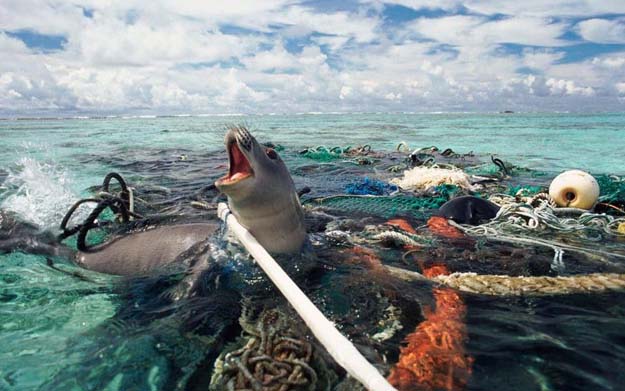
Animals become entangled in waste or swallow plastics dumped in the sea. Fish ingest the plastic thinking it’s food and starve to death with full stomachs. Credit: Plastic Oceans Foundation.
The following is an aggregation of excerpts reported by the United Nations Environment Program, NOAA Marine Debris Progam, Ellen MacArthur Foundation, and IntraFish.
[dropcap]T[/dropcap]he global production of plastics in 2014 was 311 million tonnes (metric is 0.907185 of U. S. ton). It has been estimated that in 2010 alone, between 4.8-12.7 million tonnes of plastic found their way into our oceans.
A report found that most plastic packaging is used only once; 95% of the value of plastic packaging material, worth $80-120 billion annually, is lost to the economy. Additionally, plastic packaging generates negative externalities, valued conservatively by United Nations Environment Program ( UNEP) at $40 billion. Given projected growth in consumption, in a business-as-usual scenario, by 2050 oceans are expected to contain more plastics than fish (by weight), and the entire plastics industry will consume 20% of total oil production and 15% of the annual carbon budget.
Plastic is the most prevalent type of marine debris found in our ocean and Great Lakes. Plastic debris can come in all shapes and sizes, but those that are less than five millimeters in length (or about the size of a sesame seed) are called “microplastics.”
What are Microbeads?
Microbeads are tiny pieces of polyethylene plastic added to health and beauty products, such as some skin cleansers and toothpastes.
As an emerging field of study, not a lot is known about microplastics and their impacts yet. Standardized field methods for collecting sediment, sand, and surface-water microplastic samples have been developed and continue to undergo testing. Eventually, field and laboratory protocols will allow for global comparisons of many microplastics released into the environment, which is the first step in determining the final distribution, impacts, and fate of this debris.
Microplastics come from a variety of sources
It comes from larger plastic debris that degrades into smaller and smaller pieces. Also, microbeads, a microplastic, are very tiny pieces of manufactured polyethylene plastic that are added as exfoliants to health and beauty products, such as some cleansers and toothpaste. These tiny particles easily pass through water filtration systems and end up in the ocean and Great Lakes, posing a potential threat to aquatic life.
Microbeads are not a recent problem
According to the UNEP, plastic microbeads first appeared in personal care products about fifty years ago, with plastics increasingly replacing natural ingredients. As recently as 2012, this issue was still relatively unknown, with an abundance of products containing plastic microbeads on the market and not a lot of awareness on the part of consumers.
Finally, somebody does something
On December 28, 2015, President Obama signed the Microbead-Free Waters Act of 2015, banning plastic microbeads in cosmetics and personal care products.
The current administration has made overtures to counter the Microbead-Free Waters Act, but even right-wingers are not onboard with ridding the act but attempts to expand it has met with opposition.
You may be ingesting nanoplastics
Microplastic particles are found in a large variety of marine organisms, including species we consume as seafood. The sparse knowledge on levels and effects does not indicate a health risk to humans now, but the uncertainty is high. The smallest plastic particles – the nanoplastics, are of even larger concern. They are so small that some can enter organs and body fluids of organisms, and due to their high surface/volume ratio, they can carry larger amounts of environmental toxicants.
Plastic debris breaks down very slowly in the marine environment, especially under cold and dark conditions. Levels of nanoplastics in the oceans, and how much of the plastic which is ultimately fully degraded, is not known.


